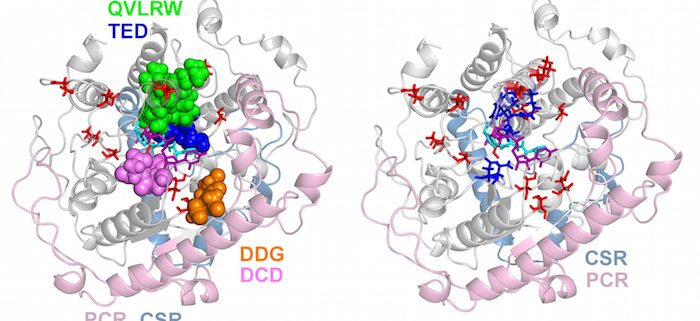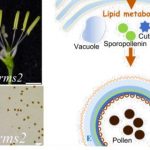A Catalytic Inhibitor of Cellulose Biosynthesis in the Toolbox
Huang et al. identify a new cellulose synthase inhibitor. Plant Cell https://doi.org/10.1105/tpc.20.00202.
By Lei Huang and Chunhua Zhang
Background: Cellulose is a polymer of b-1,4-D-glucose that serves as an essential source of everyday objects such as cloth, paper, and biofuel. Plant cellulose is synthesized by protein complexes known as cellulose synthase (CESA) complexes (CSCs), which each contain multiple units of CESA and synthesize cellulose at the plasma membrane. The detailed mechanisms underlying how CSCs catalyze cellulose synthesis in plants are poorly understood. Small molecule inhibitors that interfere with the function of CESA are useful tools that allow scientists to manipulate the process of cellulose synthesis by treating plants with the inhibitor without producing mutations in the plant genome.
Question: We were looking for plant cellulose synthesis inhibitors that could be used to better understand the process of cellulose biosynthesis. We wanted to find out how the catalytic activity of CESA is related to the cellular behavior of CSCs using the model plant Arabidopsis thaliana.
Findings: Endosidin20 (ES20) inhibits cellulose synthesis and causes typical cellulose-deficient phenotypes in plants, such as dwarf and swollen plants. We screened a large population of mutagenized Arabidopsis and identified multiple mutations in CESA6 that cause reduced sensitivity to ES20 in terms of inhibited plant growth. Further analyses showed that ES20 directly interacts with CESA6 at the catalytic site. We also show that inhibiting CESA catalytic activity using ES20 reduces the delivery of CSCs to the plasma membrane.
Next steps: Scientists have been looking for different strategies to manipulate cellulose synthesis in order to obtain products with the desired properties and to control weeds. ES20 is a powerful tool that scientists can use to transiently manipulate the catalytic activity of plant CESA, as well as a candidate herbicide. ES20 can help us discover how the catalytic process of cellulose synthesis is carried out and how other proteins participate in the process. The use of ES20 could shed light on the relationship between the catalytic site composition of CESA and the subcellular transport of CSCs.
Lei Huang, Xiaohui Li, Weiwei Zhang, Nolan Ung, Nana Liu, Xianglin Yin, Yong Li, Robert E. Mcewan, Brian Dilkes, Mingji Dai, Glenn R. Hicks, Natasha V. Raikhel, Christopher J. Staiger, Chunhua Zhang (2020). Endosidin20 Targets the Cellulose Synthase Catalytic Domain to Inhibit Cellulose Biosynthesis. Plant Cell DOI: https://doi.org/10.1105/tpc.20.00202




